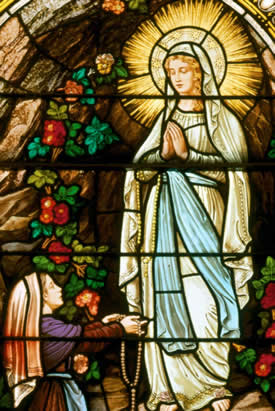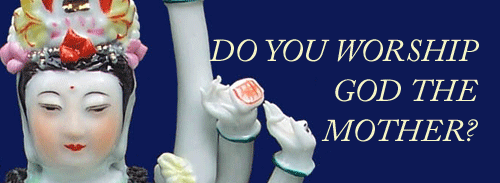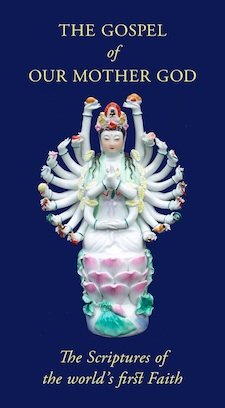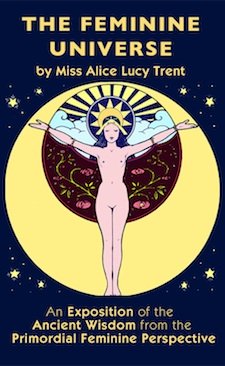Rosary Prayer Translations
For Devotees of Our Mother God
 Rosary prayer: a sacred devotion given to maid by Our Lady
Rosary prayer: a sacred devotion given to maid by Our LadyWe reverently present the suggested rosary prayer "translations" for the use of Filianic devotees of Our Mother God.
The purpose of these is to allow a Catholic-style rosary to be prayed by individuals and groups who worship Our Mother God in Her Trinitarian form, as God the Mother, God the Daughter, and the "Dark" Mother who is Absolute Deity, beyond being and unbeing; as set out in The Filianic Creed.
The term "Rosary" in Déanic usage often refers to the 108-bead chanting-Rosary. In this case, we are referring to the ten-decade Catholic-style Rosary. In both cases, of course, the metaphysical reference is to the worlds as Roses (or Lotuses), joined "like pearls upon a string" by the Thread-Spirit (strivatë) Who is Our Mother God.
This rosary follows, by close analogy, the Catholic Rosary, which is one valid approach for Western Devotees in Telluria.
Rosary Prayer 1
The Filianic Creed
This is the central statement of Filianic Trinitarian faith and can be found here with full commentary.
Rosary Prayer 2
The Our Mother
Our Mother Who art in Heaven,
hallowed be Thy name.
Thy Ranyam come, Thy will be done
In earth as it is in heaven
Give us this day our daily bread;
and forgive us our trespasses
as we forgive those who trespass against us.
And lead us not into temptation;
but deliver us from evil.
Comments: It has been suggested that a more "maternal" metaphor than bread be used. "Feed us this day upon the Milk of the Spirit" was one suggestion. It was also pointed out that mothers make bread even though in patriarchy fathers are the "bread-winners". There is a clear distinction here between the Hestia-based economy in which bread is made in the microcosm of the home, and the agora-based economy in which it is "won" from the outside.
The words Lady and lord originally mean "loaf-kneader" and "loaf-ward" respectively. Regarding bread (as traditional peoples do) not as mere material food, but as the vital sustenance of the spirit, it is clear that even patriarchal etymology regards the Lady as the Source of that sustenance and the lord as its mere outward defender.
Naturally as Filyani, we acknowledge no lord; but I suggest that the symbol of bread, viewed in its original light – both spiritually and literally kneaded and baked in the House by the Lady of the House – is wholly fitting.
Ranyam (realm) is the Aristasian term for a State ruled by a Queen and can be used in both the earthly and the Heavenly sense.
Rosary Prayer 3
The Hail Mary
Hail Mary, fount of Grace
Lady of earth and Heaven
Blessed art Thou by all maidens
And blessed is Thy most beloved daughter,
Holy Mary, Mother and God,
Shelter us fallen ones now and at the hour of hour death.
Comments: A full spoken commentary on this translation is available here.
It has been suggested that the second line [note – this has since been amended] is incompatible with Trinitarian thealogy, in that it ascribes "All Godhead" to the Mother. A full response to this (and clarification of Filianic Trinitarian thealogy) has been published here.
The amendments suggested by the right reverend and most honored Bishop Sarah of the Church of the Divine Heart are as follows:
"All glory be upon Thee"
or
"All sovereignty be upon Thee".
Rosary Prayer 4
The Glory Be
Glory be to the Mother, and to the Daughter, and to Absolute Deity
Who was before the beginning and will be when all the worlds are ended.
Comments: No discussion has taken place on this. Comments are welcomed.
Rosary Prayer 5
The Daughter Prayer
Oh my Lady, forgive us our sins,
rescue us from the ungentle winds of werde.
Lead all souls to Heaven,
especially those most in need of Your mercy.
Comments: In Filianic usage, Our Lady almost always refers to the Daughter rather than the Mother (though it can also refer non-specifically to Dea).
In accordance with recent Aristasian practice in Telluria following the resolution of the Filianist Controversy, the Daughter is not here referred to by the Personal Name Inanna.
Lead all souls to Heaven is, perhaps surprisingly, in the Catholic original, although it accords more with Déanic Universalism, which believes that all creatures must ultimately be saved "even to the last blade of grass".
"The fires of hell" [in this version replaced by "the ungentle winds of werde] raises a question to which we shall reiterate the answer previously given:
Do we believe in Hell? How can we not, since we see it? Do we not know of souls throughout Telluria who undergo tortures, starvation and terrible suffering? And these sufferings – much as it is right to end them if it is in our power – must all come from the werde of the individual concerned. Do we not know that souls have the power to inflict terrible evil? And do we not know that this evil must return to the inflicter by the law of action and reaction?
Do we believe in a place made by Dea for the torture of Her children? Certainly not! Like a good Mother, Dea may sometimes chastise Her children, but no good mother will torment, burn or starve her children.
But we are Maid. We have free will – the power of choice – and unless Dea were to take that free will away and reduce us to automata, She cannot prevent us from using our will badly and making wrong choices. Nor, logically, can She save us from the werdic reactions of those choices in this birth or in another.
But even logic and the inexorable laws of nature can be overridden by the Supreme Mystery of the Daughter's Saving Act.
Some may prefer to say "Save us from the winds of the samsara." Ultimately the two statements are equivalent.
Rosary Prayer 6
Hail Holy Queen
Hail, holy Queen, Mother of Mercy!
Our life, our sweetness, and our hope!
To Thee do we cry, poor banished daughters of the earth;
To Thee do we send up our sighs,
mourning and weeping in this valley of tears.
Turn then, most gracious Saviour,
Thine eyes of mercy towards us;
and after this, our exile lead us into
the sacred Garden of Thy Love.
O clement, O loving, O sweet Virgin Lady.
Shelter and guide us, O Holy Daughter of Dea,
That we may be made worthy of Thy salvation.
Comments: The theme of exile has a double meaning for many Aristasians, which is an extra felicity.
The "vale of tears" may be taken as equivalent to the Buddhist (and universal) concept of the dukkha, or suffering, inherent in the samsara – as well (on a much lower and more particular level) of the position of intemorphs in Telluria.
Only a few significant changes have been made to this Rosary prayer. "the sacred garden of Thy love" may be taken simply as a metaphor for being received into the full love of Dea or as a "literal" reference to the Paradise of the Daughter. The two are really equivalent.
"Virgin Lady" replaces "Virgin Mary" because this is a prayer to the Daughter, and while images of Mary may represent either Mother or Daughter (depending on the precise iconography of the particular image), the Name Mary, in Filianic usage, is that of the Mother.
This entire prayer may be seen as a response from the side of maid to the Filianic Scriptural passage regarding the nativity of Our Lady:
Rejoice, poor wanderers of the earth and exiles from the house of your Mother: for to you shall come a Guide and a deliverer.
We have attempted to translate and explain each Rosary prayer. The variations suggested here may be used at will and we are fully open to further discussion, questions and comments.
May Dea bless you, dear reader, and make all your devotions peaceful, joyful and fruitful.
See also:
How to Pray the Rosary: Introduction and full instruction for devotees of Our Mother God
Rosary Meditations: Meditations on the Five Mysteries of the Great Cycle of Filianic Religion for the five decades of the Rosary
Nativity Rosary Meditations: Meditations for the five decades of the Rosary for devotees of Our Mother God during the Nativity Season (MP3)
The Eastern Chanting-Rosary: Mala beads as a perfect devotion to Our Mother God
A sermon in MP3 format explaining in full the "translation" of the Hail Mary
A further discussion of the Hail Mary translation, and an explanation of the Feminine Trinity
The Filianic Creed: The fundamental Statement of the Faith of Our Mother God
Please support the Chapel of Our Mother God
Send Questions or Comments on Rosary Prayer Translations
Chapel of Our Mother God Homepage
All written material at the Chapel of Our Mother God is copyright. Should you wish to reproduce any portion please contact us for permission.
Facebook or Twitter
This section:
Devotional Practices
Shrines
- Shrines to Dea
- Virtual Shrine
- How to Make a Shrine
- Living Goddess Images
- Choosing a Virgin Mary Statue
- Mary Statues as Images of God
- Maria-sama no Kokoro
- Hail to the Princess: A Nativity Carol
- An Easter Hymn
- Maria Mantra: a Universal Invocation
- Inanna Lalitha Devotional Chant
- The Marianna Maria Chant
- The Great Compassion Mantra
- How to Pray the Rosary
- Rosary Prayers
- Rosary Meditations
- Nativity Rosary Meditations
- Mala Beads: The Chanting Rosary
- The Rosary of the East
Gospel of Our Mother God
The Gospel of Our Mother God is a collection of inspirational texts, prayers and daily inspiration for the Mother-Faith devotee or household.
The Feminine Universe
The Other Philosophy
Everything you have ever heard comes out of the patriarchal world-view. Its materialism, its religion, even its feminism. Here is the other way of seeing the world; the natural way: the way that everyone saw things before patriarchy and will again when patriarchy is long forgotten.


